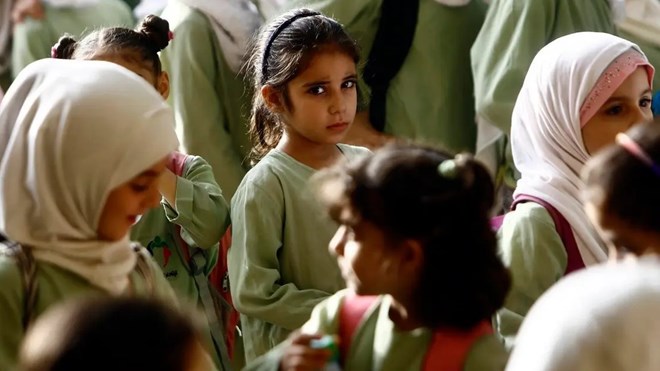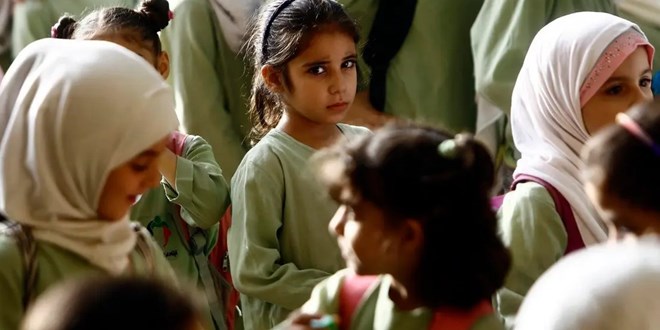[ad_1]

Sunday November 26, 2023

Syrian girls, who fled the ongoing conflict in Syria, stand in line at an all girls school in the south of Khartoum. (AFP)
Every hour, five women and girls are killed by someone in their own family. One in three women experience violence in their lifetime, and in parts of the Arab world the situation is even more devastating as nearly two-thirds of women suffer violence in their lives. Their stories are often buried by norms, stigma and shame.
One young woman who grew up in Syria’s conflict relocated to Aleppo after the war.
“After the war came to Aleppo, I stopped being a girl, because the world stopped treating me like one,” Sara told UNFPA. “Girls like me were targeted. Many were abducted, raped, or killed. For those who weren’t, the prospects weren’t much better.”
Rape, sexual slavery, sex trafficking and forced marriage are widespread. These tragic violations of human rights and dignity are used to cause fear, pain, silence and submission.
“I felt powerless,” says Khadijo, whose name was changed for privacy. She’s an 11-year-old survivor of rape in a camp for the displaced in Somalia. “I looked around but it was too dark to see who had done this to me.”
Women and girls suffer disproportionately during and after war, as existing inequalities are magnified and put them at high risk. Evidence has shown that violence against women and girls in the Arab world increases as a result of conflict and displacement, particularly in crowded, deprived and highly tense environments. Climate emergencies such as drought that cause further displacement can lead to thousands of people being crammed into camps and shelters which negatively impacts women and girls.
In Somalia, for example, we witnessed the rise in female genital mutilation – a source of income in some communities – in the displacement areas. Female genital mutilation, a dreadful, dangerous and degrading practice, remains stubbornly high in the region. In Somalia, nearly 99 percent of girls between 5- and 11-years report being cut. In Sudan, nearly three-quarters of girls are affected.
UNFPA also draws attention to the most recent attack on the population in Gaza and where protection from gender-based violence (GBV) has been impossible due to the lack of access to services, partners and supplies for personal hygiene. In Yemen, around 80 percent of the 4.5 million people displaced are women and children. Yemen has consistently ranked near last in the World Economic Forum’s Global Gender Gap Index and was listed as the worst place in the world to be a woman in 2017.
Similarly, forcing girls into marriage robs them of their childhoods and futures, yet despite progress, more than 20 percent of girls in the Arab region are married before the age of 18.
And for many women and girls, even those living in more prosperous parts of our region, no place is truly safe. Violence invades their homes, schools and workplaces and is becoming alarmingly extensive in their digital lives, on their phones, tablets and computers.
Nearly two-thirds of women and girls in the Arab region have experienced some form of technology-facilitated gender based violence. They are stormed with toxic social media posts, hate speech and violent content, or have their images sexualized, distorted and shared without their consent.
The solution lies in robust responses, including supporting women’s rights organizations and investing in prevention. Yet globally only 1 percent of gender-focused state aid is directed to women’s organizations and just 0.2 percent goes toward preventing violence against women.
Laws and policies that uphold human rights, dignity and gender equality are also crucial. All Arab states must put in place laws that put the minimum age of marriage at 18. They must improve data on violence against women, and we must work with communities to chip away at the norms and barriers that hold women and girls back and prevent them from speaking out.
Thirty years ago, at the International Conference on Population and Development (ICPD) in Cairo, the world united behind a shared vision of the future, recognizing that women and girls’ rights are central to global development and are key to reaching humanity’s potential.
To realize this vision we must root out and rid the world of violence against women and girls.
Today is International Day for the Elimination of Violence against Women, and we stand with the words of Ruba, a teenage girl from Idlib, Syria, who said: “I know the world I want to live in. Help me build it, and I will never stop working.”
Laila Baker is the UNFPA Regional Director for Arab States.
[ad_2]
